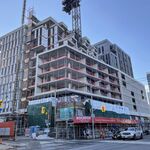While I agree with much that has been said above, I would like to say that there has been a significant cultural shift over the past 5 years that will continue to grow, and that is that condominiums (or apts/co-ops in New York, or flats in London/Paris/Shanghai, etc.) are now the new norm for Toronto and are in fact, more desirable by many, than a house. We've simply caught up to the world - who mostly live in condos. And while there may be a lot of room to build houses in the GTA or in the corridor, who the hell would want to live there? People want to live close to shops, restaurants, theatre, dance, LIFE and they don't want to have to drive. Oil will go up (watch fo $60 by the summer) inevitably and this will further the pace to live close to where you work and not commute into the city.
In 1989, owning a condo was something someone felt a little bad about. "I couldn't afford a house so I HAD to buy a condo, but I still want a house." While there are certainly some who still feel this way, the vast majority of condo owners I know are completely the opposite. During this condo boom, a condo has become a desirable thing to own, there's a sense of pride. When a person or a couple outgrow their 1 bedroom condo, they don't want a house, but a bigger condo so that they can still enjoy the lifestyle that only a condo can provide.
A significant, if overlooked, strength of the condo market is that, unlike in 1989, there are virtually no new rental properties being built in downtown Toronto. New condo's have picked up the slack for this and will continue to do so. I have rented out my condo several times and it's never taken longer than 2 days with several interested people each time. The vacancy rate is approximately 2% in condo's and that's because people are willing to pay a small premium for a premium space with gym, location, etc. If the rental market can absorb some of the new product coming online in the next 2 years, it will buffer the correction in prices. Toronto, even at it's peak, was never unaffordable or overpriced - especially for being the largest city in Canada. Immigration will pick up over the next few years as well and will hopefully buffer this as well.
As I said, I don't think it's all going to come up roses and would definitely wait another 6-12 months before jumping in (real estate is actually far less a good investment than the market), but I'm not as gloomy as most. I do agree though, that it'll take until at least 2012-13 to see prices at their Jan 2008 peak again.




